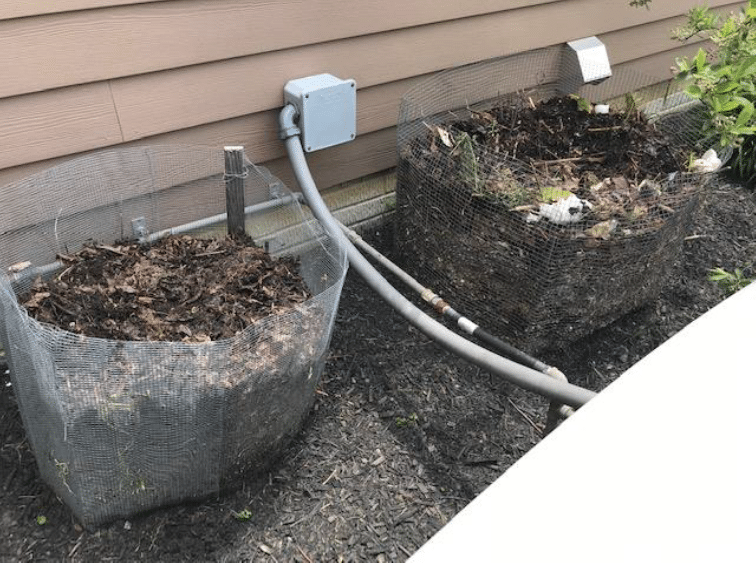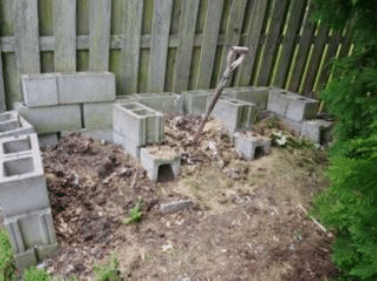Composting for Churches
By Hank Stonerook
The UCC’s Council for Climate Justice has issued “A Kairos Call to Action” which urges churches to develop 10-year mobilization plans to address climate and inequality. As part of this call to action, local churches are encouraged to utilize proven, sustainable technologies that adhere to the diversity, stability, and resilience of natural ecosystems. Among the suggested actions that relate to church grounds is the training of local leaders in composting. This paper describes how local churches can integrate composting into the mindset of their congregations.
Composting Benefits
Wastes that are disposed in solid waste landfills are eventually degraded by anaerobic means, which generates methane gas, an air emission that is approximately 25 times more harmful to the environment than carbon dioxide. Although most landfills containing solid waste are required to have methane collection systems and some do manage to utilize the collected methane as a fuel source, collection efficiency is generally less than 50 percent resulting in the release of a large portion of the methane directly into the ambient air. The removal of organic materials from the landfill and the composting of them separately will reduce the overall methane emissions and produce a reusable material for soil conditioning.
Compost material is not a fertilizer per se, but it does contain some nutrients. It reduces the need for chemical fertilizers and encourages the production of beneficial fungi and bacteria that break down organic matter to create humus, a rich, nutrient-filled material.
Composting Basics
There are a number of YouTube videos that describe in detail how composting works. If doing home composting, find an area where you can lay out three bins directly on soil (not paved base).
Compost requires brown material, green material, water, air, and labor. Brown material includes the following:
• Leaves and small twigs
• Non-glossy paper
• Straw
• Dryer lint and vacuum dust
• Coffee grounds and filters
• Fireplace ashes
• Other similar dry products
Green materials are organic in nature such as:
• Grass clippings
• Organic food wastes
• Egg shells
• Dead plants (not diseased or weeds)
• Other used food materials
Mix the above in approximate equal amounts and add water to moisten the entire mixture. Aerobic composting requires that the compost be turned every week. Depending on the climate, finished compost can be ready for use in 6 to 10 weeks.
Plastics, meats, oils and dairy products, animal feces, and other related non-degradable waste materials should not be placed into the compost system.
Home Composting
There are several alternatives for composting that local UCC churches have implemented. These include home composting systems, whereby congregants individually create and maintain their own composting systems. Two successful central Ohio home composting systems are given as examples:

The above picture is a two-stage operation with fresh compost material on the right and more finished compost on the left. The fresh compost side is 3 feet square by 2 feet tall while the processed side left is roughly 2 feet by 2 feet by 2 feet tall. This system made from available hardware-purchased material and located near the utility access area of the residents. It faces west.

This is a three-stage home composting system. New compost material is placed in the bin on the right with the mixture progressing as it decomposes to the bin on the far left. These bins measure approximately 3-feet square each with concrete blocks available to increase the height of each bin as needed to retain the material. This system is located in the resident’s yard along a fence and faces south.
Centralized Church Composting
Another composting option is to establish a church central collection site where members can bring their compostable materials to a designated location. The collected materials can then be either composted onsite by the congregation or picked up by a commercial service that composts the material off-site. Community UCC in Raleigh, North Carolina has established a drop off location at its facility and utilized a regional composting firm to handle its collected materials. The outside firm tracks the amount of waste collected and estimates the amount of CO2 sequestering that has occurred. One can watch a short video of the composting operations undertaken by Community UCC.
The impact from composting can be significant as described in this short report from Community UCC:
Compost operation time frame – October 2018 through March 2020
Pounds of food waste diverted from the landfill – 4,735
Pounds of compost created – 1,184
Methane avoided – 616 pounds
Carbon dioxide equivalent – 12,312 pounds (2.5 times methane concentration)
Equivalent miles not driven – 26,900
Tomato potential – 237 plants; 1,184 tomatoes
Municipal Composting Operations
Some communities offer drop off locations for compostable materials for residents with the collected materials being transported and composted at municipal-owned or contract vendor compost operations. In Westerville, Ohio, the local solid waste authority gave the city a grant to operate a food waste drop off station at the community’s maintenance facility. The food drop-off station is open 24-hours and emptied by a contract vendor once per week.
Summary
Composting is a viable method to reduce the amount of waste material entering landfills from churches and residences. Its individual impact on sequestering CO2 is minimal, but collectively it can provide an additional means for entities to reduce their carbon impact.
The author Hank Stonerook is a member of Westerville Community UCC in Ohio.
Related News
A Letter to My Sons About Climate Change
Dear Soren and Emerson, I am writing you this letter in 2024, but presumably you are...
Read MoreCreation Justice Earth Holders
In order to create a space for people to form deeper connections to Earth and to grieve our...
Read MoreBodily Autonomy Means Every-BODY
Advocacy and Action for Women's and Gender Justice Local events stir thoughts and...
Read More
